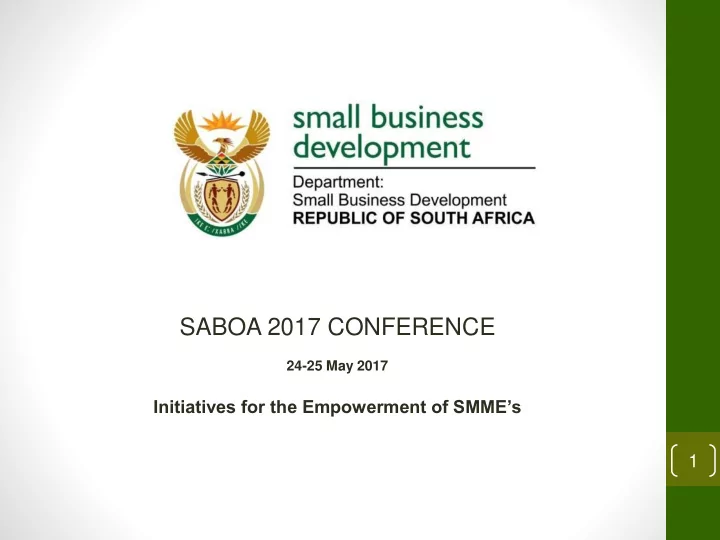

SABOA 2017 CONFERENCE 24-25 May 2017 Initiatives for the Empowerment of SMME’s 1
INTRODUCTION The National Industrial Policy Framework and its Industrial Policy Action Plan was introduced in 2007 and has continued to be the driving policy framework for industrialisation and economic development. It was also incorporated into the National Development Plan. The NIPF and IPAP consists of the following strategic pillars: SP1:Sector Strategies SP2: Industrial Financing SP3: Trade Policy SP4: Skills and Education for the Economy SP5: Competition Policy and Regulation SP6: Leveraging Public Expenditure SP7: Industrial Upgrading SP8: Innovation and Technology SP9: Spatial and Industrial Infrastructure SP10: Finance and Services to Small Enterprises SP11: Leveraging Empowerment for Growth SP12: Regional and African Industrial and and Employment Trade Framework SP13: Coordination, Capacity and Organisation 2
Industrial Financing and Incentives • Government departments offer an array of incentive schemes to stimulate and facilitate the development of sustainable, competitive enterprises by providing accessible incentives that effectively support national priorities. • A variety of incentive schemes seek to support the development or growth of commercially viable and sustainable enterprises through the provision of either funding or tax relief, thereby ensuring the creation of new and sustainable jobs. • The intention is to increase participation in various areas of development. • Most of the incentives are housed within the Department of Trade and Industry, with a few others in other government departments. 3
The Economic Cluster and related Agencies 4
5
Capital Expenditure Incentives These are incentives for companies that want to acquire or upgrade assets in order either to establish or expand the business’ productive capacity. • Infrastructural Development Incentives • Critical Infrastructure Programme (grant funding) • Industrial Development Zones • Capital Expenditure in the Automotive Industry • Foreign Investment Grant • Capital Expenditure in the Textiles Industry • Manufacturing competitiveness enhancement programme (MCEP) 6
Competitiveness Enhancement Incentives These are for investments which facilitate increased competitiveness, sustainable economic growth and development in a specific sector. • Business Process Services (grants for outsourcing business functions) • Black Business Supplier Development Programme • Export Marketing and Investment Assistance Scheme • Sector Specific Assistance Scheme • Film Production Incentive • Competitiveness in the Clothing and Textiles Industries • Co-operative Incentive Scheme • Isivande Women's Fund • Manufacturing competitiveness enhancement programme (MCEP) 7 • Gold Financing Scheme
Concept and R&D Incentives These are incentives available to private sector enterprises that invest in the creation, design and improvement of new products and processes. Such businesses conduct investigative activities with the intention of making a discovery that can either lead to the development of such new products and processes or to the improvement of existing products. • Support Programme for Industrial Innovation (SPII) • Partnership in Industrial Innovation (PII) • Science & Technology R&D Incentive – S11D of the Income Tax Act • Capital Projects Feasibility Programme (CPFP) • Technology and Human Resources in Industry Programme (THRIP) • SEDA Technology Programme 8 • Technology Venture Capital Fund • Automotive Investment Scheme (AIS)
Industry-Specific Incentives General Manufacturing • Manufacturing Competitiveness Enhancement Programme (MCEP) • Capital Goods Industry – The Capital Projects Feasibility Programme (CPFP) Additional Tax Allowance for manufacturers – S12I of the Income Tax Act • Foreign Investment Grant (FIG) Automotive Industry • Automotive Investment Scheme (AIS) • People-Carrier Automotive Investment Scheme (P-AIS) Aquacultur e • Aquaculture Development and Enhancement Programme (ADEP) Business Process Service • The Business Process Services scheme (BPS) Textiles • Clothing and Textiles Competitiveness Programme (CTCP) Film and Television • Film and Television Production Incentive 9 Tourism • Tourism Enterprise Support Programme (TEP)
Other Incentives • Black Business Supplier Development Programme (BBSDP) • Critical Infrastructure Programme (CIP) • Co-operative Incentive Scheme (CIS) • Export Marketing and Investment Assistance (EMIA) • Incubation Support Programme (ISP) • Enterprise Incubation Programme • Isivande Women’s Fund 10 • Sector-Specific Assistance Scheme (SSAS)
SEFA, Term Loan Term loan - is used to finance assets that have a medium to long term lifespan (e.g. machinery, fixtures and fittings, vehicles, office equipment). Term Loans can also be used for start-ups, expansions and acquisitions of businesses. The loan is also for a business vehicle. Duration of the Loan: The loans are usually repayable between 1 and 5 years The following industries are excluded: Tobacco, liquor, gambling, sex trade, Armaments, Speculative real estate, Leveraged buy-out funds, Hedging Borrowings, Ventures inconsistent with the mandate of SEFA. Loans to partners, the fund managers, their employees and affiliates, except for members of FSCs
NEF Supported Sectors 12
Leveraging Public Procurement Industrial Procurement – Local content Designation • The revised Preferential Procurement Policy Framework Act (PPPFA) regulations which came into effect on the 7 December 2011 empower the Department of Trade and Industry ( the dti ) to designate industries, sectors and sub-sectors for local production at a specified level of local content. 30% Procurement Set-Aside for SMMEs • National Treasury has released the revised Preferential Procurement Regulations, 2017 which were gazetted on Friday 20 January. • The Zuma’s revised regulations are also aligned to President Jacob pronouncement in his 2015 State of the Nation Address, wherein he said that government will set-aside 30% of appropriate categories of State procurement for purchasing from SMMEs, co-operatives as well as township and rural enterprises. • 80/20 preference points system : The rand value, including all applicable taxes, 13 for the application of the 80/20 preference point system has been increased from a maximum R 1 million to a maximum R 50 million.
Thank You 14
Recommend
More recommend